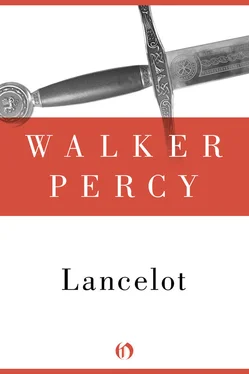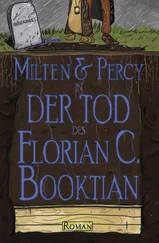Oh, yes, you speak of love. That is easy to do. But do you wish to know my theory? That sort of love is impossible now if it ever was. The only way it will ever be possible again is if the world should end.
Siobhan turned fretfully to the TV to watch the animated cartoon.
“What a coinkidinki!” Tex cried, hugging Siobhan. “Just when you asked about runny babbits. Tex turned on the TV and there they were.”
“Say coincidence,” I told Tex.
“What’s that?” he asked quickly, cupping his ear, listening for the first time.
“I said, don’t say coinkidinki to her, for Christ’s sake. Say coincidence.”
“All right. Lance,” said Tex. He listened! Maybe he hadn’t listened to me before because I hadn’t told him anything.
I pondered. Could it be true all one needs to know nowadays is what one wants?
Leaving the pleached alley of oaks, my usual route, I cut across the meadowlike front yard, took the gardener’s gate through the iron fence, and climbed the levee.
Believe it or not. I had not seen the river for years. A diesel towboat was pushing an acre of barges against the current. It sounded like a freight engine spinning its wheels. I turned around. Belle Isle looked like an isle, a small dark islet hemmed in by Ethyl pipery, Dow towers. Kaiser stacks, all humming away. Farther away, near the highway, gas burnoffs flared in the night as if giant hunters still stalked the old swamp.
The stars were dim but by following the handle of the dipper I recognized Arcturus, which my father showed me years ago. My father: a failed man who missed the boat all around but who knew how far away Arcturus was. He was editor of a local weekly, where he published his own poems and historical vignettes about this region on such subjects as St. Andrew’s Chapel: the First Non-Roman Church in the Parish (I remember thinking that my ancestors must have arrived here to find the swamp teeming not with wild Indians but with Romans). The Kiwanis Club gave him a certificate officially entitling him the Poet Laureate of Feliciana Parish. He was an ordinary newspaper poet, an ordinary newspaper historian, and he had an ordinary newspaperman’s wonder about science.
“Think of it,” he said, standing in this spot and showing me Arcturus. “The light you are seeing started thirty years ago!”
I thought about it. In those days we thought about such things.
But what I was thinking that night a year ago was not how strange it was that light from Arcturus started out thirty years ago (when we were listening to Parkyakarkus and Frank Mann, the Golden Voice of Radio) but how strangely one’s own life had turned out during these same thirty years while Arcturus’ light went booming down the long, lonesome corridors of space.
Then for the first time I saw myself and my life just as surely as if I were standing in the dark parlor and watching myself sitting at the table with Margot.
Do you know what happened to me during the past twenty years? A gradual, ever so gradual, slipping away of my life into a kind of dream state in which finally I could not be sure that anything was happening at all. Perhaps nothing happened.
That, after all, is quite a discovery for the man you knew, president of the student body, all-conference halfback. Most Likely to Succeed. Rhodes scholar, Golden Glover, holder of the record of the Longest Punt Return in the entire U.S.A.
Clearly you haven’t done too well either. You know what our trouble was? We liked to go to school too much. And into the service. I managed to stay in school or the service until I was thirty-two. And you with your M.D., D.D. In fact, aren’t you taking some courses at Tulane now?
I practiced law in a small town on the River Road. I say practice in quotes, so to speak, because I found that I was doing less and less law as time went on. True, times got harder, business was slow. In the end I was doing a couple of hours of title work a day and that was it.
One good thing about small towns: it was convenient to come home for lunch. Margot was usually there at first. We’d have a drink or two or three before lunch — something she was used to doing with her lady friends in New Orleans. That was a pleasure. After Suellen’s lovely lunch, we often made love. Not a bad life! drink well, eat well, and make love to Margot. I fell into the custom of taking a nap. The naps grew longer. Then one day, I did not go back to the office in the afternoon. Instead, and as an excuse because it was said to be good for one, I took up golf. The three other members of the foursome were Cahill Clayton Lamar, cousin and failed gentry like me, bad dentist, good golfer; and two successful newcomers, the undertaker and the chiropractor.
But golf is a bore. I quit.
During the sixties I was a liberal. In those days one could say “I was such and such.” Categories made sense — now it is impossible to complete the sentence: I am a — what? Certainly not a liberal. A conservative? What is that? But then it was a pleasure to take the blacks’ side: one had the best of two worlds: the blacks were right and I wanted to be unpopular with the whites. It was a question of boredom. Nothing had happened since I ran 110 yards against Alabama — we lived for great deeds, you remember, unlike the Creoles, who have a gift for the trivial, for making money, for scrubbing tombs, for Mardi Gras. The sixties were a godsend to me. The blacks after all were right, the whites were wrong, and it was a pleasure to tell them so. I became unpopular. There are worse things than being disliked: it keeps one alive and alert. But in the seventies the liberals had nothing more to do. They were finished. I can’t decide whether we won or lost. In any case, in the seventies ordinary whites and blacks both turned against the liberals. Perhaps they were right. In the end, liberals become a pain in the ass even to themselves. At any rate, the happy strife of the sixties was all over. The other day I ran into a black man with whom I had once stood shoulder to shoulder defying angry whites. We hardly recognized each other. We eyed each other uneasily. There was nothing to say. He told me had had a slight stroke, nothing serious. We had won. So he bought a color TV, took up golf, and developed hypertension. I became an idler.
I gave up golf and stayed home to do a bit of reading and even some research and writing: the Civil War of course: nobody knew much about what happened in these parts. I even wrote a learned article or two. Sometimes I took the tourists around Belie Isle, like my grandfather before me. But instead of telling them Eleanor Roosevelt jokes as he did, I gave them scholarly disquisitions on the beauty of plantation life, somewhat tongue-in-cheek — to see how far I could go without getting a rise from these good Midwestern folk — hell, I found out it’s impossible to get a rise from them, they hate the niggers worse than we ever did. Things are not so simple as they seem, I told them. There is something to be said for the master-slave relation: the strong, self-reliant, even piratical master who carves a regular barony in the wilderness and lives like Louis XIV, yet who treats his slaves well, and so help me they weren’t so bad off on Belle Isle. They became first-class artisans, often were given their freedom, and looked down on the white trash. “Now take a look at this slave cabin, ladies and gentlemen. Is it so bad? Nice high ceilings, cool rooms, front porch, brick chimney, cypress floors. Great arching oaks back yard and front. Do you prefer your little brick bungalow in Lansing?” They watched me carefully to catch the drift and either nodded seriously or laughed. It’s impossible to insult anybody from Michigan.
On winter afternoons it began to get dark early — five o’clock. Elgin would build us a fire and Margot and I would have several drinks before supper.
Читать дальше












